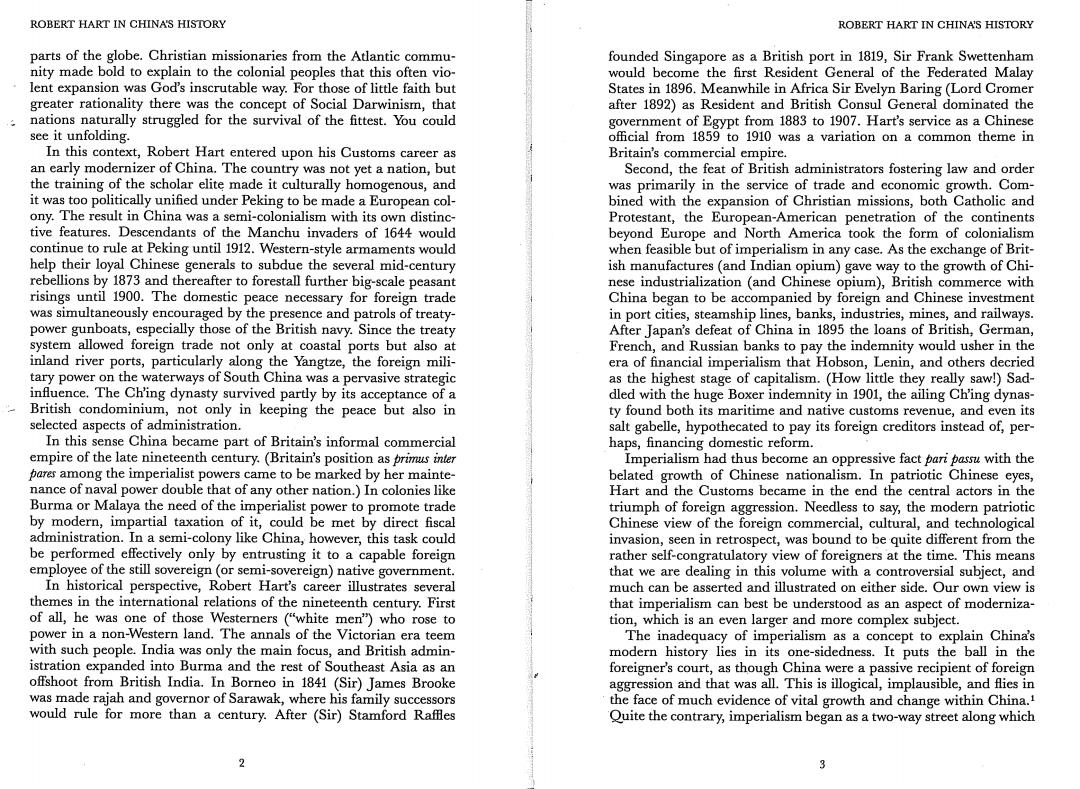正在加载图片...

ROBERT HART IN CHINAS HISTORY ROBERT HART IN CHINAS HISTORY parts of the globe.Christian missionaries from the Atlantic commu- founded Singapore as a British port in 1819,Sir Frank Swettenham nity made bold to explain to the colonial peoples that this often vio- would become the first Resident General of the Federated Malay lent expansion was God's inscrutable way.For those of little faith but States in 1896.Meanwhile in Africa Sir Evelyn Baring (Lord Cromer greater rationality there was the concept of Social Darwinism,that after 1892)as Resident and British Consul General dominated the nations naturally struggled for the survival of the fittest.You could government of Egypt from 1883 to 1907.Hart's service as a Chinese see it unfolding. official from 1859 to 1910 was a variation on a common theme in In this context,Robert Hart entered upon his Customs career as Britain's commercial empire. an early modernizer of China.The country was not yet a nation,but Second,the feat of British administrators fostering law and order the training of the scholar elite made it culturally homogenous,and was primarily in the service of trade and economic growth.Com- it was too politically unified under Peking to be made a European col- bined with the expansion of Christian missions,both Catholic and ony.The result in China was a semi-colonialism with its own distinc- Protestant,the European-American penetration of the continents tive features.Descendants of the Manchu invaders of 1644 would beyond Europe and North America took the form of colonialism continue to rule at Peking until 1912.Western-style armaments would when feasible but of imperialism in any case.As the exchange of Brit- help their loyal Chinese generals to subdue the several mid-century ish manufactures(and Indian opium)gave way to the growth of Chi- rebellions by 1873 and thereafter to forestall further big-scale peasant nese industrialization (and Chinese opium),British commerce with risings until 1900.The domestic peace necessary for foreign trade China began to be accompanied by foreign and Chinese investment was simultaneously encouraged by the presence and patrols of treaty- in port cities,steamship lines,banks,industries,mines,and railways. power gunboats,especially those of the British navy.Since the treaty After Japan's defeat of China in 1895 the loans of British,German, system allowed foreign trade not only at coastal ports but also at French,and Russian banks to pay the indemnity would usher in the inland river ports,particularly along the Yangtze,the foreign mili- era of financial imperialism that Hobson,Lenin,and others decried tary power on the waterways of South China was a pervasive strategic as the highest stage of capitalism.(How little they really saw!)Sad- influence.The Ch'ing dynasty survived partly by its acceptance of a dled with the huge Boxer indemnity in 1901,the ailing Ch'ing dynas- British condominium,not only in keeping the peace but also in ty found both its maritime and native customs revenue,and even its selected aspects of administration. salt gabelle,hypothecated to pay its foreign creditors instead of,per- In this sense China became part of Britain's informal commercial haps,financing domestic reform. empire of the late nineteenth century.(Britain's position as primus inter Imperialism had thus become an oppressive fact pari passu with the pares among the imperialist powers came to be marked by her mainte- belated growth of Chinese nationalism.In patriotic Chinese eyes, nance of naval power double that of any other nation.)In colonies like Hart and the Customs became in the end the central actors in the Burma or Malaya the need of the imperialist power to promote trade triumph of foreign aggression.Needless to say,the modern patriotic by modern,impartial taxation of it,could be met by direct fiscal Chinese view of the foreign commercial,cultural,and technological administration.In a semi-colony like China,however,this task could invasion,seen in retrospect,was bound to be quite different from the be performed effectively only by entrusting it to a capable foreign rather self-congratulatory view of foreigners at the time.This means employee of the still sovereign (or semi-sovereign)native government. that we are dealing in this volume with a controversial subject,and In historical perspective,Robert Hart's career illustrates several much can be asserted and illustrated on either side.Our own view is themes in the international relations of the nineteenth century.First that imperialism can best be understood as an aspect of moderniza- of all,he was one of those Westerners ("white men")who rose to tion,which is an even larger and more complex subject. power in a non-Western land.The annals of the Victorian era teem The inadequacy of imperialism as a concept to explain China's with such people.India was only the main focus,and British admin- modern history lies in its one-sidedness.It puts the ball in the istration expanded into Burma and the rest of Southeast Asia as an foreigner's court,as though China were a passive recipient of foreign offshoot from British India.In Borneo in 1841 (Sir)James Brooke aggression and that was all.This is illogical,implausible,and flies in was made rajah and governor of Sarawak,where his family successors the face of much evidence of vital growth and change within China. would rule for more than a century.After (Sir)Stamford Raffles Quite the contrary,imperialism began as a two-way street along which 2 3